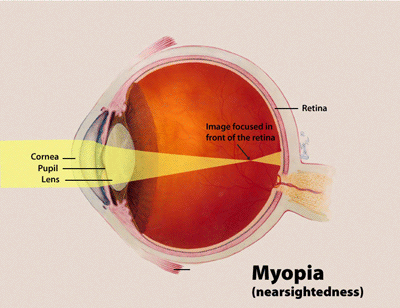Myopia

Editor-In-Chief: Prab R Tumpati, MD
Obesity, Sleep & Internal medicine
Founder, WikiMD Wellnesspedia &
W8MD's medical weight loss NYC, sleep center NYC
Philadelphia medical weight loss and Philadelphia sleep clinics
| Myopia | |
|---|---|

| |
| Synonyms | Nearsightedness, short-sightedness |
| Pronounce | N/A |
| Specialty | N/A |
| Symptoms | Blurry vision when looking at distant objects, headache, eye strain |
| Complications | Retinal detachment, glaucoma, cataracts |
| Onset | Typically in childhood |
| Duration | Long term |
| Types | N/A |
| Causes | Genetics, environmental factors |
| Risks | Family history, prolonged near work, lack of outdoor activity |
| Diagnosis | Eye examination |
| Differential diagnosis | Hyperopia, astigmatism |
| Prevention | Outdoor activity, regular eye exams |
| Treatment | Glasses, contact lenses, refractive surgery |
| Medication | N/A |
| Prognosis | N/A |
| Frequency | Affects approximately 1.5 billion people globally |
| Deaths | N/A |
Myopia (Near-sightedness)
| Also known as | Near-sightedness, Short-sightedness |
|---|---|
| Condition | Refractive error of the eye |
| Cause | Shape of lens, length of eye |
| Treatment | Glasses, Contact lenses, Surgery |
Introduction[edit]
Myopia, popularly referred to as near-sightedness or short-sightedness, is a prevalent refractive error in the eye. This condition interferes with the eye's focusing ability, particularly on distant objects.
Causes[edit]
Myopia occurs due to either:
- A too curved lens inside the eye.
- An elongated eye structure.
Because of these variations, light entering the eye doesn't focus directly on the retina. Instead, it focuses in front of the retina, leading to a blurred vision for distant objects.
Symptoms and Diagnosis[edit]
Individuals suffering from myopia often exhibit:
- Blurry vision when looking at distant objects.
- The tendency to squint when viewing television or during attempts to discern far-off objects.
- In some instances, sudden onset of myopia can signal the initial symptom of Type II Diabetes.
Treatment[edit]
There are multiple methods to rectify myopia:
- Optical aids: Includes wearing glasses with lenses designed to correct the refractive error.
- Contact lenses: Thin lenses placed directly on the eye's surface to provide clear vision.
- Surgery: Procedures like LASIK can reshape the cornea to correct myopia.
Summary[edit]
With the right intervention, be it optical aids or surgical procedures, myopia can be effectively managed. Early diagnosis and treatment can help prevent potential complications and enhance the quality of vision.
Ad. Transform your life with W8MD's Budget GLP-1 injections from $49.99


W8MD offers a medical weight loss program to lose weight in Philadelphia. Our physician-supervised medical weight loss provides:
- Weight loss injections in NYC (generic and brand names):
- Zepbound / Mounjaro, Wegovy / Ozempic, Saxenda
- Most insurances accepted or discounted self-pay rates. We will obtain insurance prior authorizations if needed.
- Generic GLP1 weight loss injections from $49.99 for the starting dose of Semaglutide and $65.00 for Tirzepatide.
- Also offer prescription weight loss medications including Phentermine, Qsymia, Diethylpropion, Contrave etc.
NYC weight loss doctor appointmentsNYC weight loss doctor appointments
Start your NYC weight loss journey today at our NYC medical weight loss and Philadelphia medical weight loss clinics.
- Call 718-946-5500 to lose weight in NYC or for medical weight loss in Philadelphia 215-676-2334.
- Tags:NYC medical weight loss, Philadelphia lose weight Zepbound NYC, Budget GLP1 weight loss injections, Wegovy Philadelphia, Wegovy NYC, Philadelphia medical weight loss, Brookly weight loss and Wegovy NYC
|
WikiMD's Wellness Encyclopedia |
| Let Food Be Thy Medicine Medicine Thy Food - Hippocrates |
Medical Disclaimer: WikiMD is not a substitute for professional medical advice. The information on WikiMD is provided as an information resource only, may be incorrect, outdated or misleading, and is not to be used or relied on for any diagnostic or treatment purposes. Please consult your health care provider before making any healthcare decisions or for guidance about a specific medical condition. WikiMD expressly disclaims responsibility, and shall have no liability, for any damages, loss, injury, or liability whatsoever suffered as a result of your reliance on the information contained in this site. By visiting this site you agree to the foregoing terms and conditions, which may from time to time be changed or supplemented by WikiMD. If you do not agree to the foregoing terms and conditions, you should not enter or use this site. See full disclaimer.
Credits:Most images are courtesy of Wikimedia commons, and templates, categories Wikipedia, licensed under CC BY SA or similar.
Translate this page: - East Asian
中文,
日本,
한국어,
South Asian
हिन्दी,
தமிழ்,
తెలుగు,
Urdu,
ಕನ್ನಡ,
Southeast Asian
Indonesian,
Vietnamese,
Thai,
မြန်မာဘာသာ,
বাংলা
European
español,
Deutsch,
français,
Greek,
português do Brasil,
polski,
română,
русский,
Nederlands,
norsk,
svenska,
suomi,
Italian
Middle Eastern & African
عربى,
Turkish,
Persian,
Hebrew,
Afrikaans,
isiZulu,
Kiswahili,
Other
Bulgarian,
Hungarian,
Czech,
Swedish,
മലയാളം,
मराठी,
ਪੰਜਾਬੀ,
ગુજરાતી,
Portuguese,
Ukrainian


